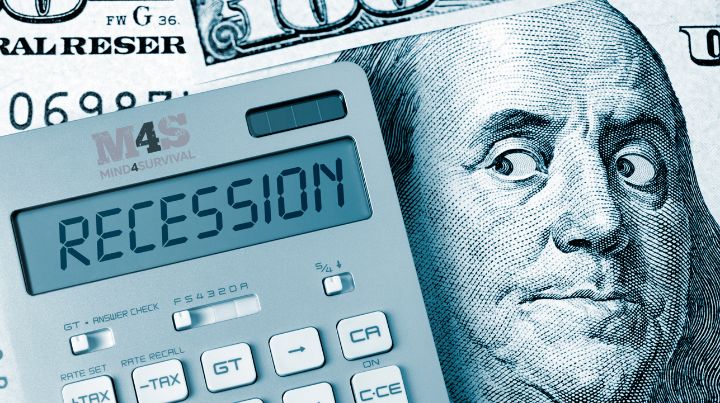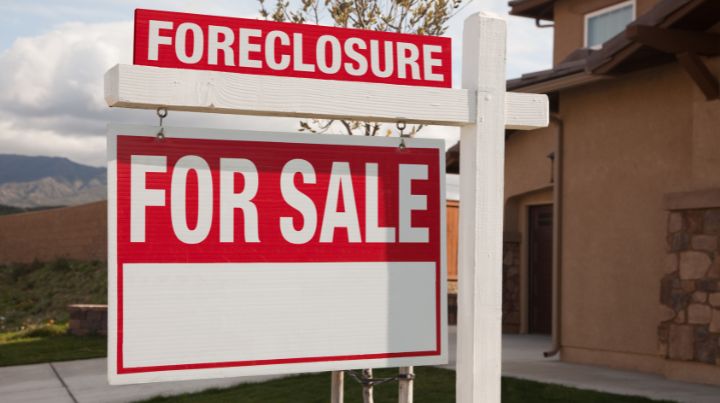Compounding Problems of the Recession

I keep looking at the statistics the United States is witnessing on inflation at the moment, and the compounding problems of a recession are both alarming and depressing. As we sink further into what I believe are just the beginning thralls of this, I can’t help but wonder what one can do to save money in a recession.
How do you save money during a recession when fiat currency is rapidly becoming worthless and it’s becoming harder and harder to pay your bills?
Recession: Where's it Leading
I’ll let the investment gurus tackle the idea of investing in tangibles, heavy metals, and other similar “survivor” investments. The reason I keep thinking about the importance of getting out of debt now has to deal with foreclosures.
What happens when banks across America realize that inflation is not only not getting better or slowing down, but it is rapidly growing worse? I think the only solution that they can turn to is to call in their debts. This is the only practical solution that makes sense from the banker’s standpoint.
They know that the paper their debtors are paying them every month for their motorcycles, car, and home are growing less and less valuable by the day. But the property? Well, that still holds its value. A house, an RV, a farm? Those are all intrinsically worth something. Fiat currency is not.
When bankers across America finally conclude that it makes more financial sense for them to own tangible properties rather than a debased currency, it only makes sense in my mind that they are going to start calling those debts in. The idea of people getting notices in their mailbox that they have 90 days to pay their debts in full or face foreclosure doesn’t seem that far off of a notion to me.
To be sure, there would be widespread outrage, but I don’t see it stopping anything other than perhaps inducing some form of bigger government.
The Loss of Self-Sufficiency

Maybe those people will have had a little bit of money in their savings accounts or stowed away in a gun safe before all this happens, but that savings won’t amount to much when it comes to paying off the debts they’ve racked up over the years.
This is why I think that one of the best ways to save money at the moment is to pay off your debt. Make money fast and pay debt off fast. When or if the mass foreclosure day comes to bear, the people who have paid off their debts will have done more to save their money than anybody else. They won’t have made payments for years only to have everything taken away. They’ll have made payments for years and then finally own something.
They won’t lose their means of transportation or be forced to live in government housing. They’ll own what they have and what they have will hold intrinsic value. Should that person then later decide that they want to move somewhere else, not only will they have the ability to do so, but they’ll be able to change the value of their home into the value of something else. Maybe gold, silver, land, ammo, or an RV are involved. I don’t know. But value will be exchanged for value.
The Great Depression
I don’t see any examples of this having happened during The Great Depression. The people who lost everything back then didn’t do so as much from hyperinflation but from banks collapsing due to Fed policies. I don’t think there are as many parallels with that as there are today/in the near future other than the suffering due to poverty.
I would like to take a closer look at how things played out with the hyperinflation of the German mark post-World War 1. This was strict hyperinflation, and I think it is more pertinent to modern times. Did the banks of Germany follow this same thought process? From what I know of this period, it doesn’t seem that this was the case. For whatever reason, banks then didn’t follow this logic. They just willingly suffered.
That Lends Us to the Questions:
In what ways will banks and other creditors respond when they realize they will retain more wealth by foreclosure rather than by fiat money repayment, and will you be in a good financial position with whatever they decide?
If you ask yourself those two questions, I think you will have something of a grasp on what my thoughts are as to how you save money during a recession. But what do you think? Tell us in the comments below. I’m particularly interested in learning your thoughts on German hyperinflation.
Additional Resources:
Related Articles
FREE Guide
Read the Best Seller
Join Mind4Survival
Stay informed by joining the Mind4Survival! 100% Secure! 0% Spam!
Affiliate Disclosure...
Mind4Survival is a free, reader-supported information resource. If you make a purchase through our link, we may, at no cost to you, receive an affiliate commission.
Do You Want To Be Ready No Matter What?

Download our free 39-page guide with interactive, 7-Day Emergency Kit Checklist and take the first step toward real preparedness.
- Know exactly where to start.
- Save time and money.
- How-to build a complete Basic Emergency Kit.
- Level up your safety and security.
Join Mind4Survival
Stay informed by joining the Mind4Survival! 100% Secure! 0% Spam!







To anyone interested in this topic, I suggest reading The Great Depression: A Diary by Benjamin Roth. It’s impressive. I wrote an article about the similarities of that period for The Organic Prepper about it and this diary still amazes me (https://www.theorganicprepper.com/diary-great-depression/)